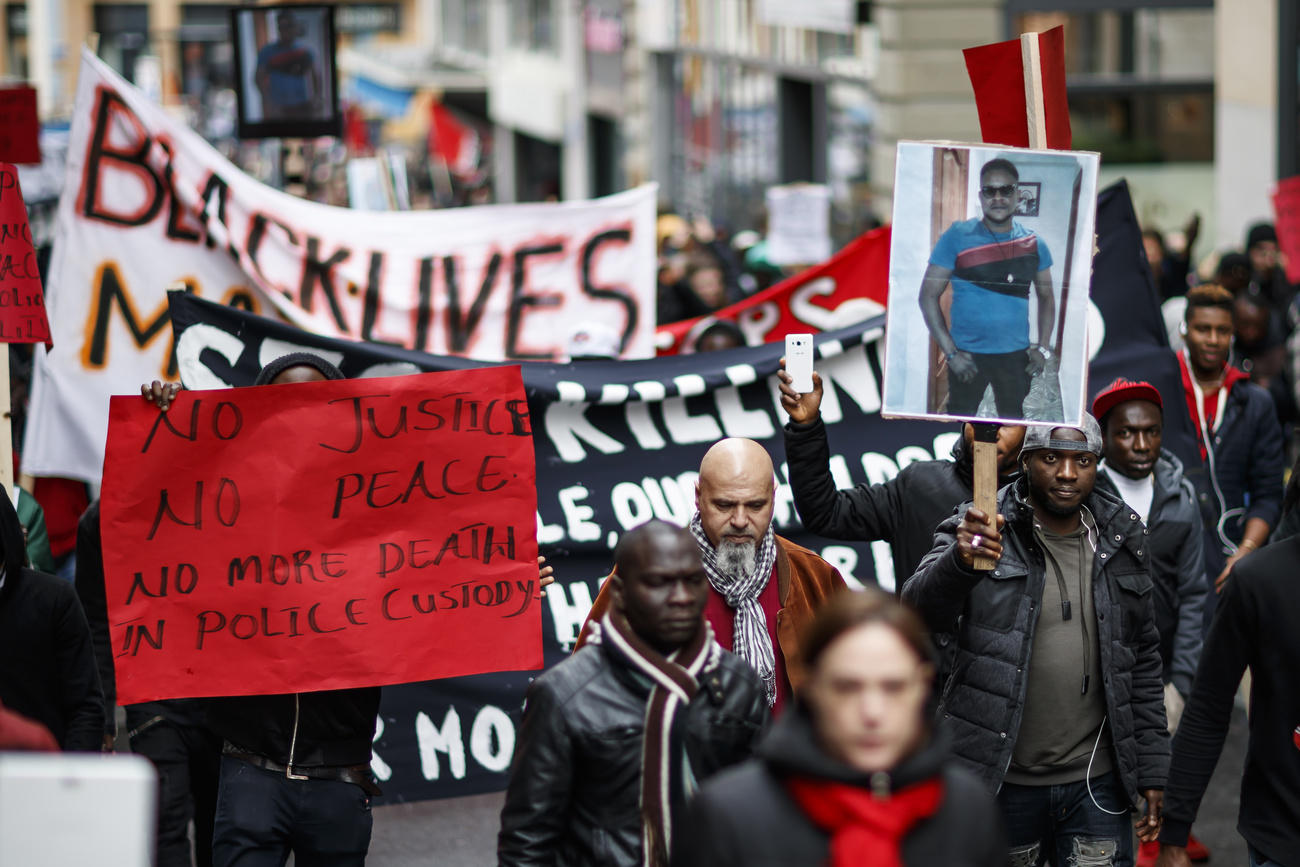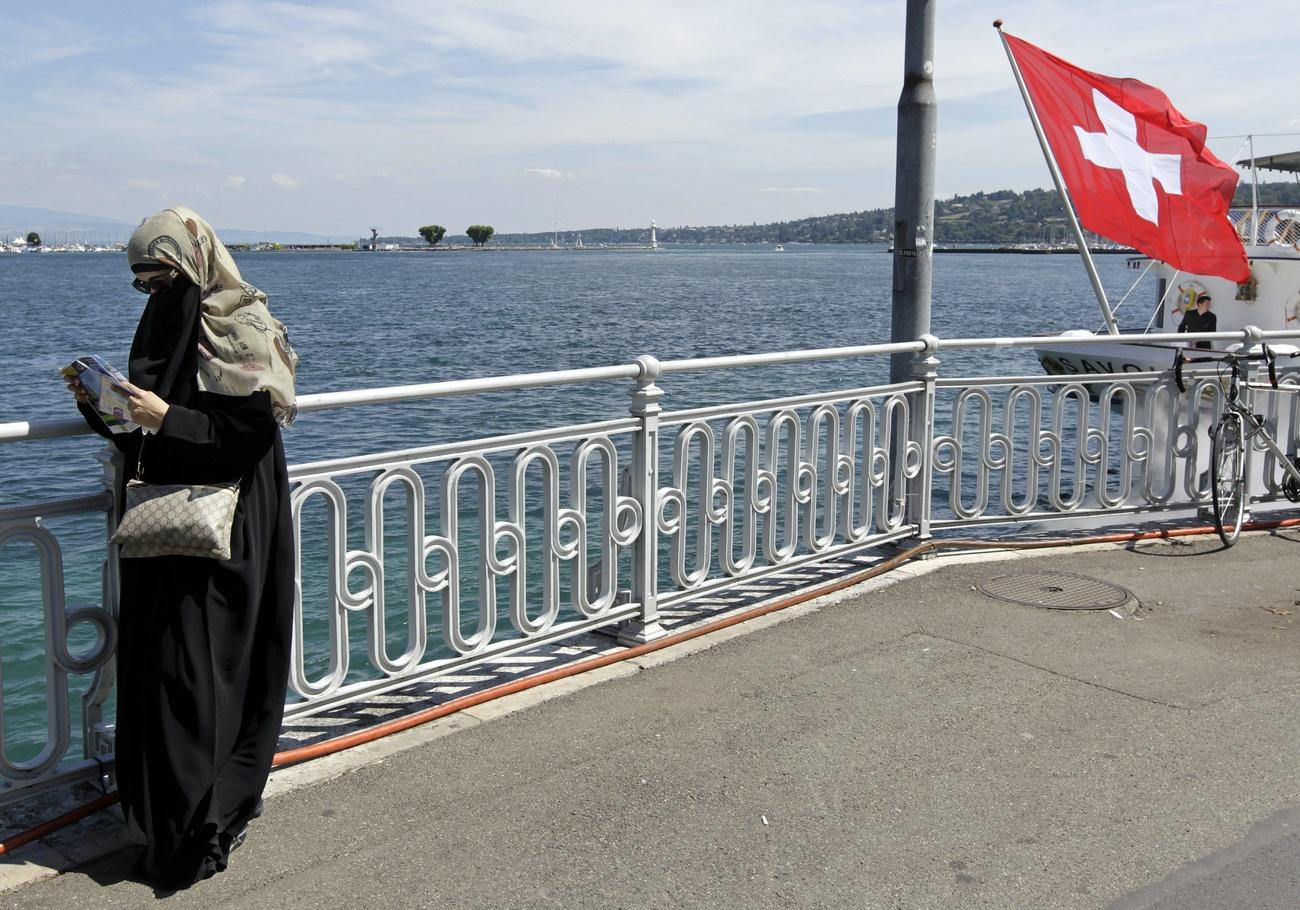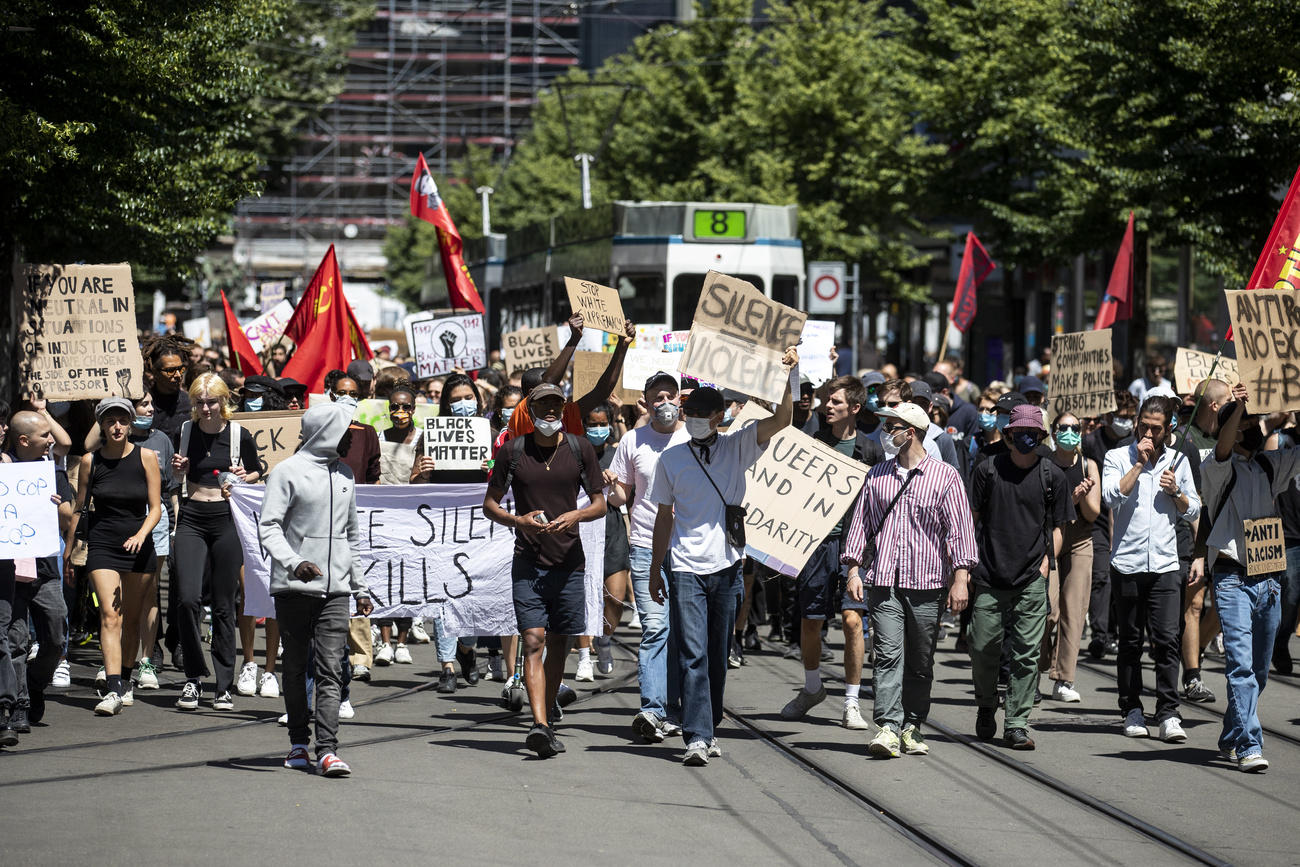
‘People of colour always have to look over their shoulder’

Wilson A.* is a Nigerian-born naturalised Swiss citizen, who has lived in the country for nearly two decades. Here, he shares his experiences with racism and the police.
As told to author Jessica Davis Plüss.
It is very emotional for me to talk about my experience. Sometimes I tell myself that maybe I am at fault or being too sensitive or that I am overreacting. But there are structural problems in society that I see every day.
People are protesting in the streets around the world because they are sick and tired of the situation. People are sick and tired of staying silent, of keeping our composure when people call you names or the police pull you aside because of the colour of your skin. Speaking out sets me free from this loneliness and this paranoia that I feel when I walk on the street.
I know what George Floyd and Eric Garner were feeling. I said those same words, “Let me breathe”. The police pulled me off a tram and I told them that I have a heart condition, but they put me in a chokehold to the point that I was gasping for air.
According to Wilson’s accountExternal link, just after midnight on October 19, 2009, he and a friend were taking the tram back home in Zurich after a party when they were stopped by police officers. They asked the men to show their identification cards and for them to come off the tram. Wilson asked the police officers not to touch him because he had just had a heart operation.
They ignored his request and touched him. A scuffle ensued whereby the officers used pepper spray and wrestled Wilson to the ground in a chokehold. Wilson says that one police officer also insulted his race and told him to “go back to Africa”.
The officers, two men and a woman, denied wrongdoing and argued later that they had to defend themselves against the man, who had assaulted them during a police check. They denied the racial slurs.
Hospital reports state that a confrontation of this kind in a cardiac patient like Wilson could be life-threatening. Wilson and his lawyer brought a criminal complaint against the three police officers accusing them of abuse of power and endangering Wilson’s life and health.
The long-running case was initially scheduled to be heard in 2016 following a ruling by the Federal Court, which overturned attempts by the prosecutor and a cantonal court to abandon proceedings.
The Zurich District Court acquitted the police officers in April 2018. In the ruling, the judge argued that there was insufficient evidence and questioned the credibility of Wilson’s statements. Wilson seeks to appeal.
There are many good people and wonderful things about being in Switzerland. There are of course times when nasty words are said to me for no reason. I have to overlook it, but it hurts. Sometimes I ask myself: “Do I really fit into this society? Will I ever be accepted? Will I ever stop looking over my shoulder?”
When I first arrived in Switzerland around 2001, there were many more black people in Zurich. But, over time, people have left the country or moved to the countryside because they can’t cope with police aggression in Zurich.
Even the Zurich Ombudsman’s latest reportExternal link acknowledged the difficult experiences of people of colour. There are people who have lost their lives, but you don’t hear about it in the news. People are afraid to report it.
Experiencing police violence
I have tried to pursue two cases against the police. In one incident the police profiled me on the street in front of a restaurant and slammed me up against a door in broad daylight. They pushed my head up against the glass and wrenched my mouth open. They thought I was a drug dealer.

More
2019 data shows racism on the rise in Switzerland
I went to the restaurant the next day with my wife who is Swiss-Canadian to see if anyone witnessed it. Someone at the restaurant was a witness and said he was horrified by what he saw.
I brought a case against the police, but my lawyer dropped it after six months. I know why now. You can’t count on the justice system to bring justice. The stress is too immense. It was an experience that I wasn’t ready for.
The experience terrified me, and I have never been able to shake the memory of that moment.
The other case was the one in the tram that has been reported in the mediaExternal link. I was choked by the police. It reminds me of every second that these guys [George Floyd and Eric Garner] went through. They think you will give up. There is hospital documentation that shows strangulation on my neck.
I know that I am very lucky to be here today. SomeExternal link have not been so lucky.
Little transparency
Switzerland doesn’t want anyone to know. It is easy to show that it is happening in other countries.
Nobody can say it is worse in the US than here because there is no proof of it. There is no widespread use of bodycams in Switzerland. There is no medium where police actions are being monitored. At least the police are being checked in the US with bodycams.
People are also afraid to capture incidents on video because some have faced legal consequences and been told to delete their footage as a result of filming police actions.
If a person of colour takes out their mobile phone to record an action, they have to be ready for the consequences.

More
Swiss police officers cleared of racial profiling
Switzerland is small and the situation of black people in the country is not exactly the same as it is in some other countries. When I visited a friend in Canada, I told my friend that I can’t forget my ID card when I go out because of police checks. He told me that I am being paranoid. It follows me everywhere I go. It never leaves me, this paranoia that they will come for me or they are looking for me.
Becoming an activist
I have joined the Alliance against Racial ProfilingExternal link because if we don’t stand up now to say no, it will go on. It is not all about me, there are so many people out there – refugees, Muslims, Jenisch people – who are afraid. We want to create awareness outside Switzerland of what is happening here because there is little hope with the judiciary support here.
We also want to provide psychological support because it is easy to get in a dark and lonely place when this happens to you. We need to raise our voices for those that can’t speak out. People of colour here feel like they always have to look over their shoulder.
I have two children and I have hope when I see people marching and the new generation in the US, in the UK and in Zurich. I am against violence, but violence is the language of the unheard. I don’t agree in hurting innocent people, but you can understand that people are frustrated. When I see the awareness and what is happening in the US, I am hopeful that the wave will get here.

More
Anti-racism protesters take to streets of Zurich
Statistics about police brutality and ill treatment in Switzerland are hard to find as the numbers are not compiled nationally. However, a 2017 UN human rights reviewExternal link revealed that the previous year, for example, 29 criminal complaints had been made against Swiss police for ill treatment.
At the UN Human Rights Council in 2018, Switzerland agreed to establish an independent investigation mechanism to deal with complaints against the police and to punish offenders found guilty.
One case of alleged police brutality has attracted considerable attention recently in Switzerland. It involves a Nigerian man, Mike Ben Peter, who was arrested in Lausanne in February 2018 for suspected drug dealing. During the intervention, officers allegedly immobilized the 40-year-old facedown. He was later taken unconscious to the hospital where he died. An autopsy said he had suffered a heart attack.
A case has been opened against six Lausanne officers who stand accused of his wrongful death. A hearing took place last week; other sessions are planned in July and September ahead of a possible trial.
*Full name has been withheld
With additional reporting by Simon Bradley, swissinfo.ch.

In compliance with the JTI standards
More: SWI swissinfo.ch certified by the Journalism Trust Initiative




























You can find an overview of ongoing debates with our journalists here . Please join us!
If you want to start a conversation about a topic raised in this article or want to report factual errors, email us at english@swissinfo.ch.